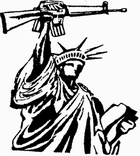Click Here to Puruse the old Flyover-press
Please Click ton Ab
Liberty knows no compromise
Click to Subscribe to Our Free Daily News Service
Donate today to help defray the costs of this important free newsletter
A Condensed Version of For a New Liberty: The Libertarian Manifesto by Murray N. Rothbard
Compiled by
Dr. Jimmy T. (Gunny) LaBaume
Chapter 10: The Public Sector, I: Government in Business
Unquestionably, people fall into ruts. Particularly in the area of government, they follow blindly and are content in believing that whatever has been must be right. For centuries, government has been supplying certain necessary services – defense, firefighting, streets, roads, water, sewage, garbage disposal, postal service, etc. – are all identified with the State in the public mind. As a result, any attack on State financing is commonly (and erroneously) considered to be an attack on the service itself.
Anyone suggesting that private enterprise should replace government in these areas is treated as he would be if the government had been supplying shoes as a tax-financed monopoly — ” Who would supply shoes if the government didn't? You are opposed to the public and to poor people who couldn't afford shoes! Etc, etc…”
There is no way that a free market for anything that has been the domain of government could be precisely described in advance. In Rothbard's own words: “The essence and the glory of the free market is that individual firms and businesses, competing on the market, provide an ever-changing orchestration of efficient and progressive goods and services.”
However, we can offer a few guidelines on how such markets might develop. Granted, no one can predict the number of firms, the size of each firm, the pricing policies, etc that would emerge. However, economic theory and historical insight tells us that such a “free market will do the job infinitely better than the compulsory monopoly of bureaucratic government.” The free market will always supply more and higher quality goods and services and do it more cheaply than monopoly government can.
Not just inefficiency but also conflict is inherent in any government operation. Operational decisions are coercively imposed on the minority. This is true whether it be educational policies (what will be taught in schools) or the kind of water we will drink (fluorinated or non-fluorinated). No such arguments occur where consumers are free to purchase the goods or services they demand. There are no battles over what kind of newspapers, churches, books, records or automobiles will be established or manufactured. Whatever is produced reflects the diversity and strength of consumer demand.
On the free market the consumer is king. On the other hand, a government operation suffers from “ a grave and fatal split between service and payment.” Government does not get its income as does the private firm, from serving the consumer. Instead, it acquires its income from mulcting the taxpayer. It has no need to worry about losses or bankruptcy. So, the consumer becomes a annoyance—someone who is "wasting" the government's resources. The result is that he (the consumer) is treated like an unwelcome intruder—an interference in the quiet enjoyment by the bureaucrat of his steady income.
In the private sector, the firm welcomes an increase in consumer demand and expands its operations to meet it. By contrast, government urges (even orders) consumers to "buy" less, allows shortages to develop, as the quality of its service deteriorates.
Examples abound: Note the government threats made against people who dare drive their cars on the government's overcrowded streets.
Another example is chronic city water "shortages." Government, holding the compulsory monopoly of the supply of water, fails to supply enough water because it fails to price at the market clearing level (the level that equates supply and demand). The response is always not to blame itself, but to blame the consumer and outlaw lawn sprinkling, etc.
Then there is the similar response to accelerating crime. Instead of providing efficient police protection, the city will force innocent citizens to stay out of crime-prone areas by setting a curfew. After all, it is easier to arrest an innocent citizen for a curfew violation than it is to rid the area of crime.
And the political bureaucrats' standard response to these problems is always: "The taxpayers must give us more money!"
Why doesn't private enterprise have such problems? How is it that they do not have trouble finding capital to expand their output? Firms that successfully serve the public find it easy to obtain capital. Inefficient firms do not (and eventually go out of business). The answer is that there is no profit-and-loss mechanism in government to induce either expansion or contraction of operations. No one truly "invests" in a government operation. Government must raise its "capital" by literally conscripting it through taxation.
Many people think these problems could be solved if "government were run like a business." So, it sets up a pseudo-corporate monopoly (for example, the Post Office) that is allowed to float bonds on the market. But there are fatal flaws inherent in any government operation which cannot be avoided by this device. First, all government service is always a monopoly (or semi-monopoly) with all (or nearly all) private competition outlawed. This means that the service will be more costly and of poorer quality. Such a pseudo-business cannot go bankrupt or suffer losses. It need only cut services or raise its prices. The second fatal flaw is that a government corporation can never be run as a business because its capital is conscripted from the taxpayer. Its ability to redeem its bonds ultimately rests on the power of taxation.
And there is yet another problem. The reason private firms are efficient is because the free market establishes prices which permit the firms to calculate their costs and price their products. Goods and services are properly allocated through this price system. In contrast, central planning provides no means (prices) for calculating costs and prices and the economy is, therefore, thrust into hopeless calculational chaos. Furthermore, ever-greater chaos and disruption is introduced as government grows.
The solution is to abolish the public sector and convert all operations and services performed by the government into activities performed voluntarily by the private-enterprise economy.
Continue to the next chapter...
*Note: We hold no special government issued licenses or permits. We don't accept government subsidies, bailouts, low-cost loans, insurance, or other privileges. We don't lobby for laws that hurt our competitors. We actively oppose protectionism and invite all foreign competitors to try to under price us. We do not lobby for tariffs, quotas, or anti-dumping laws. We do not support the government's budget deficits: we hold no government or agency securities.
To Subscribe to our daily e-mail alert service, send an e-mail with the word "subscribe" on the subject line.
Visit Our Advertisers
Email for Advertising Rates
Use the link or send an email to: adinfo@flyover-press.com

